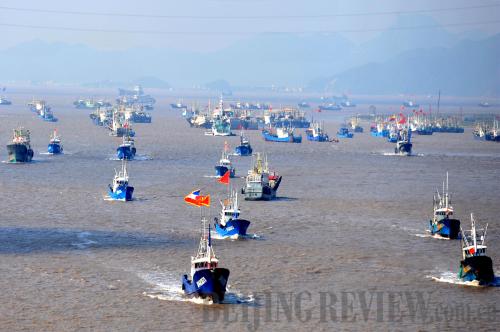|
 |
|
FISHING FOR FAIRNESS: Fishing ships in Zhoushan, Zhejiang Province, sail to the East China Sea after a three-and-half month summer fishing moratorium on September 17 (CFP) |
Times have changed, but Japan's militaristic ambition has not.
On September 18, 1931, Japanese militarists began an invasion of northeast China. After 81 years, two Japanese right-wing activists illegally landed on the Diaoyu Islands—an inherent part of Chinese territory—further provoking the Chinese people following Japan's illegal "purchase" of the islands several days earlier.
China reiterated its stance on protecting its sovereignty and territorial integrity, stressing it reserves all legal rights on the Diaoyu Islands. Observers point out that Japan's aggressive acts are a threat to regional peace and stability by challenging the existing international territorial structure formed after World War II. They have called on Japan to resume rational and peaceful negotiations on the Diaoyu Islands and get back on the track of regional cooperation.
The Diaoyu Islands and their affiliated islands have been China's inherent territory since ancient times, until Japan stole the islands through invasion in the late 19th century. With an eye to history, China and Japan reached consensus on setting aside disputes over the islands when they normalized diplomatic relations in 1972.
Japan's recent actions concerning the Diaoyu Islands provoked strong reactions from China. Observers condemned Japan's defiance toward the victorious outcomes of World War II and the post-war international order, bringing danger not only to the region, but also to the whole world.
"Japan's actions are agitated by a far right-wing force, not nationalism," Shi Yongming, a researcher with the China Institute of International Studies (CIIS), said to Beijing Review. As an invader who inflicted severe calamities on many Asian countries in World War II, Japan should seriously reflect on its war crimes. However, since the 1980s, right-wing activists in Japan have repeatedly denied history, and the "nationalization" of the Diaoyu Islands is the latest and most dangerous move in this regard.
Japan's aggressive moves have triggered alerts in the region. Commenting on Japan's ambition over the Diaoyu Islands, the Russian Ministry of Foreign Affairs stated that Russia is willing to work with China on protecting the original post-war agreements, calling on China and Japan to handle the dispute in a civilized manner.
"Russia's attitude is concerned with the judicial basis of the Diaoyu Islands," stressed Shi Yinhong, a professor of international relations and Director of the Center on American Studies at Renmin University of China, adding that the post-war order is mainly based on documents produced during World War II.
Jin Canrong, Associate Dean of the School of International Studies at Renmin University of China, pointed out that no legal document exists to prove Japan's sovereignty over the Diaoyu Islands.
According to the Cairo Declaration and the Potsdam Proclamation, which were jointly released by China, Britain and the United States during World War II, the Diaoyu Islands should have been returned to China along with other Chinese territories after Japan was defeated on August 15, 1945. The United States gained administration of Okinawa through "trusteeship" after the war. Considering its strategic needs in confronting the Soviet Union, it betrayed its determination of strictly punishing Japan and decided instead to form an alliance in East Asia against the Soviet Union during the Cold War.
In 1951, Washington and Tokyo signed the Treaty of San Francisco without China's participation, choosing to "return" Okinawa's sovereignty to Japan. The Chinese Government released a statement on September 8, 1951, refusing to accept the illegal treaty. In 1953, the United States extended Okinawa's administration to the Diaoyu Islands, in spite of China's protests. On December 31, 1971, China reiterated its sovereignty over the Diaoyu Islands in a statement by the Ministry of Foreign Affairs. "The Treaty of San Francisco tries to legitimize Japan's so-called sovereignty over the Diaoyu Islands," said Jin.
| 